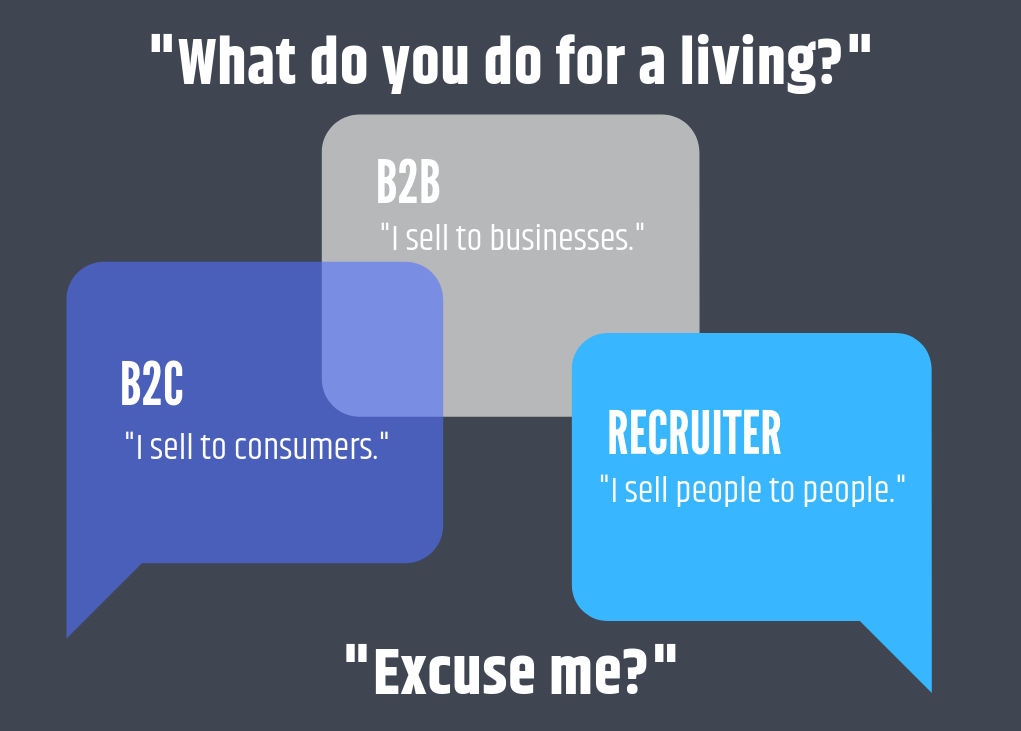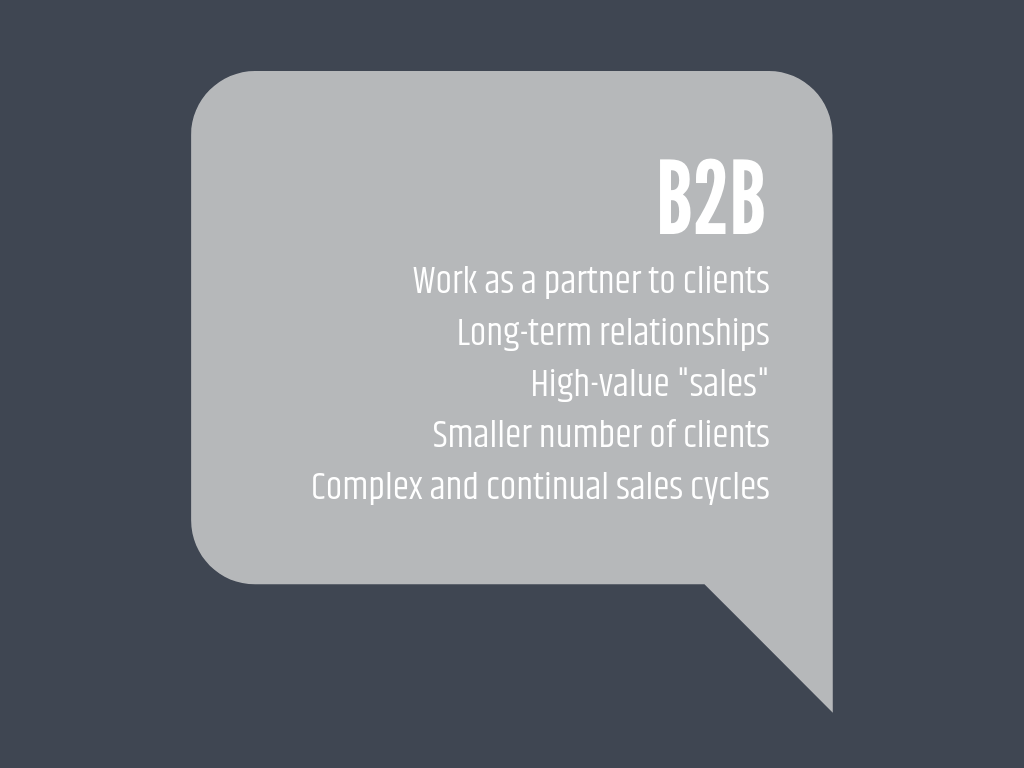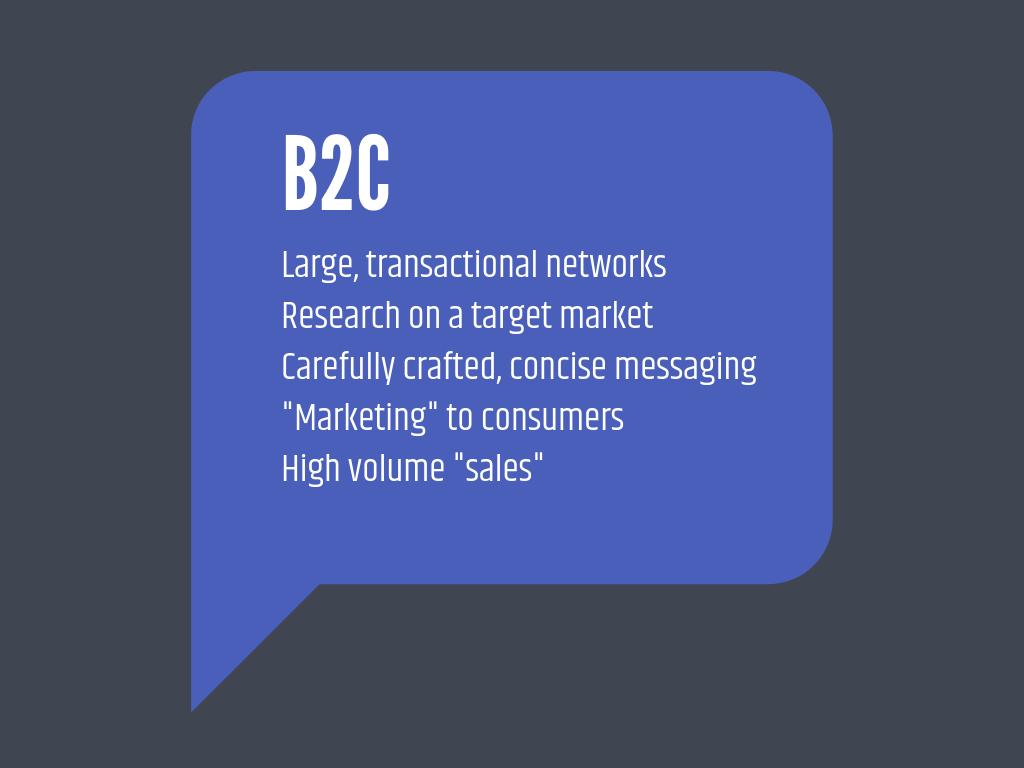Many professionals have worked with recruiters in some capacity or another throughout the course of their careers. It’s common knowledge that recruiters help businesses fill open roles with qualified professionals. But have you ever really thought of the logistics behind this?
To be successful in sales, it takes a very particular combination of skills, attitude, and character. Salespeople must be confident, persistent, upbeat, and influential by nature if they hope to convince someone to buy what they are selling - whether it’s a product, service, or in certain cases, top talent.
Someone selling B2B must be an expert in their product. These companies who sell products and services to businesses are known to have long-term sales cycles. In most cases, this means developing established relationships with clientele to best understand their needs and ultimately deliver custom solutions. B2B sales are high value transactions, with elaborate influencing groups, stakeholders, business cases, and negotiations. Their high-stakes, high-reward model is complex but consistent.
B2C sales on the other hand, need to be able to roll with the punches. They will have shorter, more transactional sales cycles and will need to quickly create rapport with several different buyers in a day. Although their sales tend to be smaller in size, they are much greater in volume and require a diverse set of approach tactics and strategies.
Recruiters, in their unique circumstances, must create a balance and perfect mixture between the two selling philosophies. They must be able to sell a candidate to a company, but also a company to a candidate.

Why Recruiting is like B2B
At Blue Signal, we partner with our clients to act as an extension of their business. We strive to make our client relationships long-term, mutually beneficial, and as transparent as possible. Blue Signal invests in our clients’ successes and we make it our job to learn all there is to know about their business products, services, pain points, and goals. Our recruiters do a SWOT (strengths, weaknesses, opportunities, and threats) analysis for each role - making sure we have pinpointed the problem and are able to remedy the hiring issue… whether that be a need for people with different skillsets, an open role that needs filled, a culture fit or transition, or a number of other challenges.
This is much like the B2B model in that we establish a strong foundational relationship with our client stakeholders and must continue to develop the relationship with regular follow-up. CEO’s, management, reporting teams, cross-functional teams, and other individuals can be the driving force behind a hiring decision - so the stakeholders are often diverse and complex. These B2B “sales” are very high value. Blue Signal will charge the client a percentage of the placed candidate’s base salary, which often times requires some negotiations. To combat this fear of commitment, our recruiters must make meaningful, strong business relationships with the appropriate parties to truly create value and trust. The stakes are high, but with our superior caliber of talent, so is the ROI.
Recruiting is also similar due to the comparably small number of clients, and more complex and continual sales cycles. Blue Signal’s client base is hand-picked, relevant to our industry specialties, and truly decides our fate when it comes to sales success. We strive to understand the ins and outs of the business, their talent needs, their standing in their respective industry, where they are headed, and more. Each client is unique, so each tactic to complete their searches must also be unique. This requires a specific set of communication skills and developed business case analysis, presentations, negotiations, and more. We hope to make each of our clients long-term customers.
When you think of recruiting as a business - this B2B model makes sense! And is normally what people attribute to the industry. However, that’s really only one side of the conversation.

Why Recruiting is like B2C
Blue Signal has an extensive network of candidates and superior industry professionals that we constantly keep in contact with to help supplement their best career options. This network - unlike our client network - is much larger and much more transactional.
That word - transactional - has such a negative connotation. When really, all that’s meant by it is that our relationship is based on a transaction. In our first contact - recruiters have to sell themselves and their worth to a candidate rather quickly. Their goal is to establish a base level of rapport early. Recruiters may speak to hundreds of candidates in a week - and have to create meaningful touchpoints with each one in order to be successful. Each candidate has a unique set of skills, desires, needs, and other factors so each touchpoint has to be carefully crafted yet quick - much like the B2C tactics used by salesmen calling upon customers. Recruiters are trained to uncover candidate’s career drivers, potential job dis-satisfaction, and other things that get down to the candidate on a personal level. They really dial into the things that drive candidates in order to play into those wants and needs and create a longer lasting placement - unlike companies who often miss the mark by merely focusing on their bottom line. Therefore, the relationship between a recruiter and a candidate is transactional - yet precise and personal.
To truly craft this in-depth and thorough understanding of the individual behind the resume, Blue Signal processes each prospective candidate with a 12-point assessment. We inspect their career drivers, their ambitions, insecurities, behaviors - what makes them tick. A recurring example is people who lie in interviews. If they are in front of a hiring manager, looking for a job, they will say what they think that manager will want to hear to better their chances of getting the job. And - that can be more harmful than helpful in the long run. The candidate and hiring manager may ignore red flags or make compromises, both for the sake of fulfilling their short-term needs. By omitting their real desires, they may not be able to reach agreeable goals. We want to really get to know the candidate and understand what they want, so that we can do our best to place them somewhere they will be happy. This research is reminiscent of the time and effort all B2C companies put into understanding their target market, but on a scale of more than 100 interviews a week (i.e. more than 100 different “consumer” profiles - a Blue Signal recruiter’s target metric).
Not to mention, candidates today are exhibiting consumer behaviors more than ever. According to a survey by MRINetwork, “nearly three-quarters (72 percent) of candidates spend more than an hour researching a job and employer before even applying, and 16 percent of job seekers spend more than five hours!” This trend, coupled with the literal million open jobs without people to fill them, is putting candidates in the driver’s seat. They are doing more research into role responsibilities, company culture, compensation averages, and other key factors in a new job. This is turning recruiters into marketers - having to sell the company, the opportunity, and their structure better than any Glassdoor review ever could. Recruiters have the potential to be that mediator and representation to the hiring process and “customer” that both parties are unable to accomplish themselves.

Recruiters, The Perfect Blend
In many ways, recruiting is one of the most unique jobs in the world. As our CEO Matt Walsh uniquely indicates, “we are selling people to people!” Recruiters sell on all sides: they sell value to a client, they sell their relationship to candidates, they sell a client’s opportunity to a candidate, and they have to sell a candidate to a company - all before they even make a “sale.” They must maintain a balance between the two sales philosophies: taking the B2C human and consumer element and merging it with the B2B business scenario to create favorable outcomes for both parties.
Recruiters bring so much value to the hiring process. They strive to have that deeper understanding of candidates, their career drivers, and why they do what they do. They work to be partners to clients and invest in their success. A recruiter’s success depends on properly managing solutions to each party’s requirements and doing what is right for everyone. Blue Signal is proud to have some of the highest ethics and proven results in this dynamic industry, and strives to maintain that transparency in all aspects of our “sales”.
